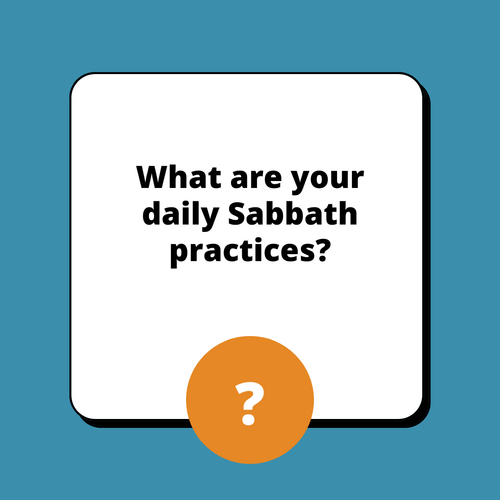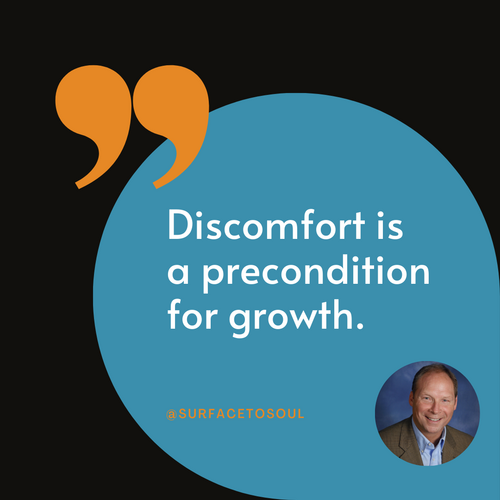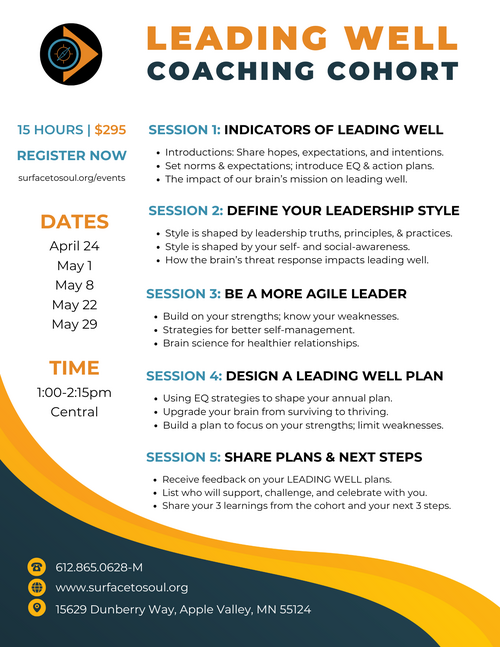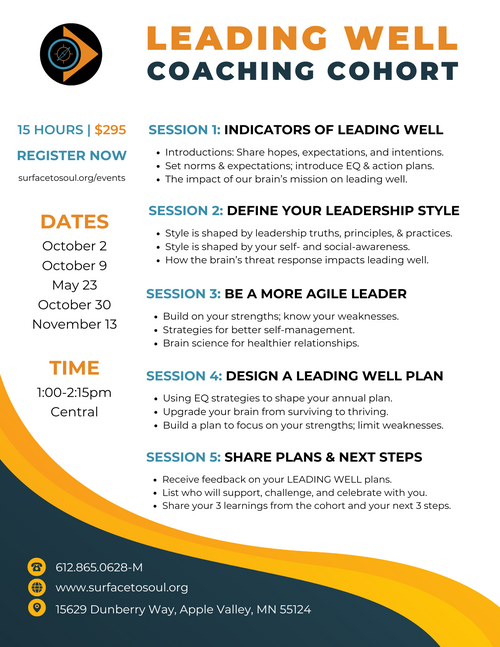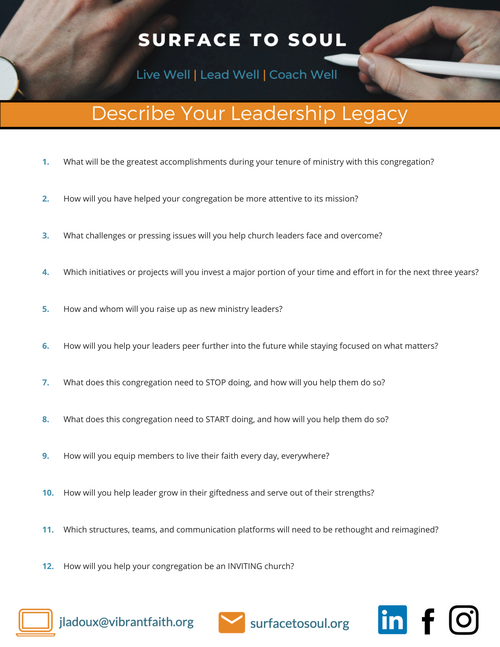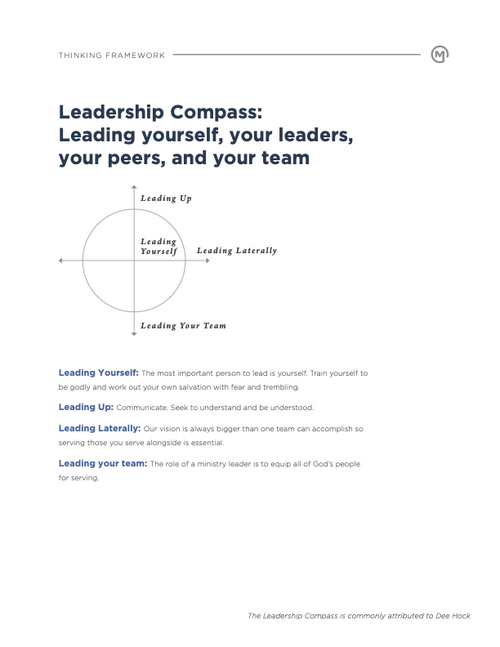

SESSION 2 | Review of Leadership Principles
1 | Share Introductions & Outcomes
- Introduce self; share why leading well matters to you.
- Share where you'd like to exercise influence.
- Consider ways you can learn & resource each other.
- Differentiate between leading VS managing.
- You'll design & share a Leading Well road map/plan.
Attitude
- Be positive.
- Be present.
- Be playful and proactive
- Be open to new ways of leading well
- Be on time
- B ready to contribute,
- Volunteer to "go first."
- Be willing to stretch yourself and trust the process.
- What's shared in our space, stays in our space.
- We're not here to "fix" each other's problems.
- We seek to draw upon everyone's wisdom.
2 | List the PEOPLE you wish to lead
- How will you lead yourself?
- How will you lead your friends & family?
- How will you lead your staff?
- How will you lead your board/elected leaders?
- Where do you intentionally show up as a leader?
3 | Highlight the 10 Principles
- List which ones might be part of your principles.
- List principles you feel may be missing from the list.
- List which principles are most important for you to pay attention to, right now.
- List how these principles would/could show up in your settings of influence?
- List assumptions you hold that may limit your ability to exercise your influence.
PRINCIPLE 1 - Leadership is about influence
- Do you see yourself as a change agent?
- Do you see yourself as a culture creator?
- How does your "showing up" change things?
- Where will you exercise your influence?
- With whom will you exercise your influence?
PRINCIPLE 2 - Leadership is a choice
- When are there times when your abdicate your leadership?
- How does your presence contribute to a different result?
- What makes it hard to consistently show up?
- What self-limitations do you impose on yourself?
- What can you learn from leaders that consistently show up?
PRINCIPLE 3 - Leadership is built on trust
- Do people trust your motivations/intentions?
- Do people feel that you have their back?
- Do people feel that you speak the truth?
- Do people trust that you'll deliver on results?
- Do people know you well enough to trust you?
PRINCIPLE 4 - Leadership is a team sport
- Are you a good follower?
- Do your teams play fair?
- Do your teams know what the "wins" are?
- Do your teams know HOW to win?
- Do team members know their individual contributions?
PRINCIPLE 5 - Leaders are future-oriented
- Do you know where you wish to take people?
- Do you know how you want your culture to change?
- Do you consistently anticipate and adapt?
- Do you know what you wish to celebrate 1 year from now?
- Are you willing to lead people into uncharted territory?
PRINCIPLE 6 - Leaders are listeners & learners
- Do you take adequate time to listen?
- Do you take adequate time to observe?
- Do you see people are a source of wisdom?
- Do you listen without seeking to respond?
- Do you have a plan for listening well?
- Do you lead differently now than you did 2 years ago?
- What are you reading or watching that's stretching your leadership understandings and capacities?
- Who are the people that serve as mentors for you?
- Do you have a plan for ongoing leadership development?
- What feedback loops have you created to help you be a better leader?
PRINCIPLE 7 - Leaders are decision-makers
- How will doing less enable you to do what matters?
- What do you need to say NO to be able to say yes to what really matters?
- How do you help your leaders keep the main thing the main thing?
- What's needed for your team to make better decisions?
- Saying NO leads to managing people's unmet expectations.
- If you don't say NO to things, how will you have the time and energy to reinvent ministries?
PRINCIPLE 8 - Values drive commitment
- Which values inform your decisions?
- Which values do you embed in your organization?
- Do you know what your leaders' value?
- Do you know what your organization values?
- Have you considered creating operational values?
PRINCIPLE 9 - Leaders raise up new leaders
- Are you adding leaders so that you can multiply your impact?
- Are you developing the leaders you currently have?
- What would happen if every leader you work with had a PLD plan?
- When is following an effective way to lead?
- With whom to you need to share power and delegate authority?
PRINCIPLE 10 - Leadership is an affair of the heart
- What do you love about the role you play as a leader?
- What do you want for the people you lead?
- What does investing in your leaders look like?
- As a leader, how do you unleash another person's potential?
- What's different about leading VS managing?
4 | Introduce "Design Your Leading Well Road Map"
- What will be the the focus of your plan?
- What will be your strategies for fulfiling a plan?
- What will be your initial next steps?
- What will support your intentions? Hold you accountable?
- What resources do you need for the journey?
5 | Reflection questions & next steps
- What were your takeaways from Session 1?
- What do you need to do before Session 2?
- Where or with whom do you improve your leadership?
- What principles might you add to the "10" we discussed?
- List 3 people you feel model effective leadership. What do they consistently say and do that makes them an effective leader?
- What your history with setting & reviewing goals?
- What will you no longer tolerate?
- What's working for you? What's not working?
- What do you need to say NO to right now?
SESSION 2 | Introduction to Leadership Practices
1 | Share Applications to Session 1 Topics
- What's stirring based on Session 1 conversations?
- Which principles "showed up" this past week?
2 | Introduction to Leadership PRACTICES
Practices are the things we consistently say and do to exercise transformative influence on the people and organizations we lead. This cohort highlights 8 specific practices leaders should continue to refine and embed in the way they lead others.
QUESTIONS
QUESTIONS
- What practices do you consistently exercise that you feel make a profound impact on others?
- Do you current have a plan for enhancing your current practices?
PRACTICE 1 - EMBODY the way for others
Great leaders model behaviors they hope that other leaders also replicate. What they say and do should reflect the mission, vision, and values of the organizations they serve. Many leaders model the way for others but fail to challenge other leaders to do the same.
QUESTIONS
QUESTIONS
- In what ways do you embody the mission and values of your organization?
- How often do you talk about your organization's mission and values?
- In what ways do you celebrate the fulfillment of your mission?
- In what ways do you measure your impact?
- In what ways do you send mixed messages to others based on what you say and do?
PRACTICE 2 -ENVISION a shared, preferred future
Leaders are future-oriented. They define reality, anticipate the opportunities and challenge they will in the, and they invite others into conversations that inspire a shared vision for their organization.
QUESTIONS
QUESTIONS
- Do you invite people to dream about your church?
- Do your members/leaders know your dreams for your organization?
- When and where do you co-create a better future?
- Who are the dreamers in your setting that you need to partner with more intentionally?
- How will you create space for intentional dreaming?
PRACTICE 4 - ENABLE others to act
Leaders remove the "friction points" in their organizations that prevent people from doing their best work. They run interference for others and they have each other backs when they encounter resistance. They improve systems and processes that hinder decision-making and the quick implementation of strategies.
QUESTIONS
QUESTIONS
- Do people know what you're seeking to accomplish?
- Do people know what it matters?
- Do people know how the plan will unfold?
- Do people know their personal contributions?
- What do people need to success?
- What are the obstacles that need to be removed?
PRACTICE 3 - ENLIST the right leaders
Great leaders recognize the importance of getting the right people on the bus, and in the rights. They position people for maximum impact. They also get the wrong people off the bus.
In addition, they properly onboard, support, and resource leaders to be successful in their endeavors.
QUESTIONS
In addition, they properly onboard, support, and resource leaders to be successful in their endeavors.
QUESTIONS
- What's your process for inviting people into leadership roles?
- What's your criteria for selecting the right leaders?
- What do they need to know to make an informed decision?
- Do you keep an "enlistment" list of current and future leaders?
- What's the price you pay for not selecting the right people for the right roles?
PRACTICE 5 - ENGAGE people in crucial conversations
Effective leaders engage in crucial conversations in timely fashion. They connect these conversations to the mission and values of the organization and what their teams need to do their best work. They're clear about their, expectations, what needs to happens next, and what will happen if behaviors don't change.
QUESTIONS
QUESTIONS
- How comfortable are you with entering into difficult conversations?
- What are some of the tough conversations you need to have sooner rather than later?
- Do you use scripts to guide difficult conversations?
- What conversations need to be dropped or deferred to make space for consequential conversations?
- What is your role in facilitating conversations that need to occur?
PRACTICE 6 - EQUIP people to review, rethink & reinvent
Leaders take time to regularly review their results, note what's working and what's not working, record their observations and learnings, and then imagine new and better ways of fulfilling their mission.
QUESTIONS
QUESTIONS
- What is your organization's history with evaluating programs and activities?
- What's your organization's history with conducting performance reviews?
- What would you do differently if you were starting a new church in your local community?
- How do you help leaders have funerals for programs and activities that need to end?
- Do you add time on your calendar for intentional reviewing, rethinking, and reinvention?
PRACTICE 7 - EMPOWER others to own their results
Leader empower others to set wins and to own their decisions, actions, and results. They provide opportunities to gain new skills and knowledge, and arrange to have people walk alongside them as mentors and coaches.
QUESTIONS
QUESTIONS
- Do you establish "wins" for your programs and activities?
- In what ways do you help or hinder your leaders willingness to own their actions, choices, and results?
- Do you give leaders templates that help them do their best work?
- Which results do you need to own?
- Which results do you need to help others own?
PRACTICE 8 - ENCOURAGE the heart
Leaders say THANK YOU often, in person , publicly and privately, and through words, texts, emails, hand written cards, and token gifts. Their observations and affirmations are specific and usually point to the organization's mission and vision.
QUESTIONS
QUESTIONS
- What do you do publicly to encourage and celebrate people's contributions?
- What encouragement activities seem to have the greatest impact?
- How do you make sure that people's efforts don't fall through the cracks?
- How are you helping other leaders be intentional encouragers?
- Do you set aside time in your schedule to encourage others?


